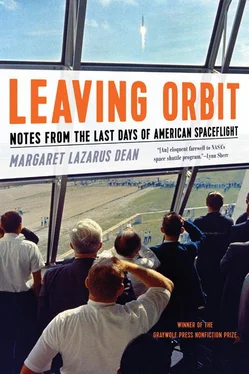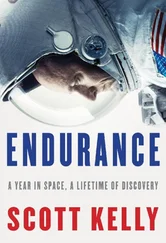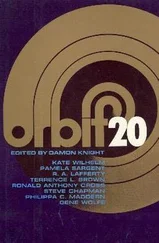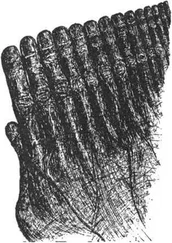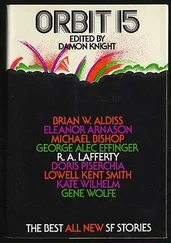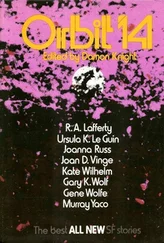Norman Mailer’s book is about witnessing the launch of Apollo 11— Life magazine had commissioned him to go to the Cape to write about the launch in exchange for a sum of money rumored to be somewhere between extraordinary and obscene. I hadn’t known, before I came across it, that Norman Mailer had written a book about Apollo 11—I knew him for having written the best-selling novel The Naked and the Dead , for cofounding the Village Voice and helping to spearhead New Journalism, for winning both the Pulitzer Prize and the National Book Award for The Armies of the Night , for running for mayor of New York and finishing fourth out of a field of five in the Democratic primary, and for stabbing his second wife, nearly to death, at a dinner party. But here, it seems, he had also written a book about spaceflight. The article in Life , and the book that subsequently expanded on it, are both ungainly wandering things with oceans of technical details and self-conscious linguistic tics. Norman Mailer could never quite get both arms around the subject, but he tries in a way that few have, and I witness in his very struggle one of the best expressions I’ve seen of what American spaceflight means: the boredom of waiting, the wondering whether one should be feeling something more, then, suddenly, feeling it—excitement, or patriotism, or pride in one’s own species, the big-brained nonquitting species that would set itself such a ridiculous goal and then meet it so spectacularly.
When I read all these books, I’m encountering other minds struggling with the same questions while walking the same landscape. With Norman Mailer especially, the only one of the three to undertake to describe a launch, I feel as though he and I are tugging on opposite ends of the same thread, a thread forty years long. I am often struck with jealousy for the era he lived in. Sometimes it seems as though Norman Mailer’s generation got to see the beginnings of things and mine has gotten the ends.
* * *
Juan Ponce de León stumbled across Cape Canaveral in 1513 while he was searching a new land for gold, slaves, and the Fountain of Youth. He’d left his home in San Juan Bautista (now called Puerto Rico) aboard the ship Santiago and headed north, toward a landmass that had been sighted clearly enough to be included on maps, but upon which no European had yet made a landing. The chronicler Antonio de Herrera writes in 1610:
And thinking that this land was an island, they called it La Florida, because it presented a beautiful vista of many blossoming trees and was low and flat; and also because they discovered it during the time of Easter [Pascua Florida]. Juan Ponce wanted the name to conform to [agree with] these two aspects [reasons]. They went ashore to gather information and to take possession.
Books still use the word discovery to refer to this voyage, but that term doesn’t quite seem to apply when some of the natives Juan Ponce encountered on the shores of the new land had actually traveled to San Juan Bautista; some even greeted him in his own language. The landmass we now call Florida was not understood, at first, to be a peninsula, and in fact Juan Ponce died believing that what he had “discovered” was a largish island.
We don’t know where exactly on Florida’s east coast Juan Ponce de León first landed, but we do know that shortly afterward, in April 1513, his travels down the coast brought him to Cape Canaveral. There he found only scrubland and unwelcoming natives. By all accounts, Juan Ponce and his men declared Cape Canaveral uninhabitable and piled back into their boats to see what else this new land had to offer. After they abandoned the Cape to the wind and the mosquitoes, no Europeans returned for nearly three hundred years, by which time the native people who had inhabited the Cape had either been wiped out by disease and violence with other tribes or had migrated elsewhere. A few European families raised citrus groves—the Indian River region is especially well suited to growing high-quality oranges—but aside from them, the area remained almost entirely uninhabited. That is, until after World War II, when the Air Force was scouting sites for testing rockets. A rocket range has some odd geographical requirements: it needs to be as close to the equator as possible (so Earth’s rotation can help propel lifting bodies), it requires a great deal of undeveloped space in case of mishap on the ground, and ideally it should border on a great deal of water, in case errant rockets fail or have to be shot down. Cape Canaveral met all of these requirements.
According to an uncredited Air Force publication about the history of the Cape charmingly titled From Sand to Moondust , Ponce de León sailed the coast of Florida “meeting at every landing hostile Indians whose appearance gave no indication of wealth and who did not offer to lead him to hidden treasure or magic fountains.” It’s true that Juan Ponce would never find either, but his fantasies of youth and wealth have somehow embedded themselves into the underlying fantasy of Florida itself. At any rate, Florida is the oldest surviving European place name in the United States. Today, the landscape around the Kennedy Space Center is in most ways oddly unchanged from the day Ponce de León abandoned it in frustration. This incidental preservation is one of the many strange gifts of spaceflight.
* * *
My father drives calmly down Kennedy Parkway, the Vehicle Assembly Building filling the windshield. I’m glad he’s driving; I’m anxious about being late to meet Omar and might have been prone to speeding. I try to anticipate what our first face-to-face conversation will be like. As I’m considering what we might say to each other, we pass an SUV being driven slowly, just below the speed limit, and when I glance out the backseat window over at the driver, a young Hispanic man chatting with his passenger, I think, Oh, that’s my friend Omar. I’ve only seen small blurry pictures of Omar on his Facebook page and would not have thought I would recognize him. But a few minutes later, when we find the parking lot with the Redstone rocket Omar has told me to look for, the SUV is there too. The driver steps out and asks, cautiously, “Margaret?”
Omar is neatly dressed in an athletic shirt and khaki shorts. He is about my height with a round, kind face and a buzz cut like a Mercury astronaut’s. It’s not until that moment, as I’m introducing myself and my family, that I consider that Omar took a risk by meeting me too, that he might not have known what to expect from a female English professor with a spaceflight obsession—that he might have been as anxious about our meeting as I was, and he went out of his way to invite me here anyway.
“I hope you didn’t have too much trouble finding it,” Omar says politely after shaking everyone’s hands, though he’s given me both detailed directions and an iPhone map image with a pin dropped at the exact spot. “I realized later that ‘Redstone rocket’ might not be the most helpful landmark for everyone.”
“I know my rockets,” I assure him.
“Ah. I figured you might,” Omar says. A second later he adds, “You don’t really look like your picture. But I knew you anyway.”
Here under the Redstone rocket, I reach out and hug him, though I am not generally a touchy person. I’m so pleased to discover that this is my friend Omar: he is exactly who he seemed to be, exactly who I thought he was all along. My father snaps a picture of the two of us together under the Redstone, the first of many he will take today.
Omar has brought three other friends for Family Day, all of them locals who grew up with space shuttles rattling their windows. We all climb into Omar’s SUV and approach the checkpoint at the south gate to the Kennedy Space Center. Omar shows his work badge to the armed guard, who allows us through. Now on NASA grounds, we pass the DAYS TO LAUNCH sign. Discovery ’s last flight is scheduled for November 1, 2010, thirty-six days from now. Discovery is already stacked on the launchpad—if all goes as planned, we’ll get to see it up close later today.
Читать дальше
